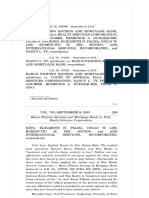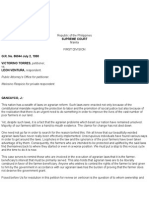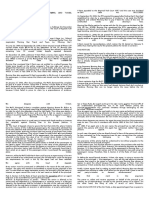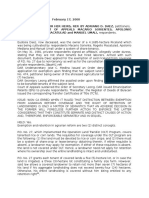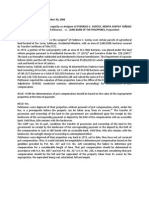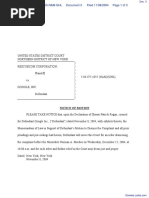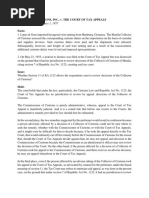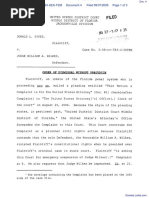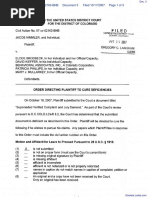0 ratings0% found this document useful (0 votes)
148 viewsBautista Vs Araneta
Bautista Vs Araneta
Uploaded by
Athena SantosPetitioner Bautista claimed to be a lawful tenant of a 3-hectare parcel of land formerly owned by Gregorio Araneta II since 1978. In 1991, armed guards sent by respondent Patricia Araneta, the successor to Gregorio Araneta II, disturbed Bautista's possession of the land and threatened him. The Provincial Adjudicator and Department of Agrarian Reform Adjudication Board ruled in Bautista's favor. However, the Court of Appeals reversed, finding that tenancy requires the consent of the true landholder. The Supreme Court affirmed, holding that tenancy cannot be established through the acts of one without rights to the land, and that certifications of ten
Copyright:
© All Rights Reserved
Available Formats
Download as DOCX, PDF, TXT or read online from Scribd
Bautista Vs Araneta
Bautista Vs Araneta
Uploaded by
Athena Santos0 ratings0% found this document useful (0 votes)
148 views1 pagePetitioner Bautista claimed to be a lawful tenant of a 3-hectare parcel of land formerly owned by Gregorio Araneta II since 1978. In 1991, armed guards sent by respondent Patricia Araneta, the successor to Gregorio Araneta II, disturbed Bautista's possession of the land and threatened him. The Provincial Adjudicator and Department of Agrarian Reform Adjudication Board ruled in Bautista's favor. However, the Court of Appeals reversed, finding that tenancy requires the consent of the true landholder. The Supreme Court affirmed, holding that tenancy cannot be established through the acts of one without rights to the land, and that certifications of ten
Original Title
Bautista vs Araneta.docx
Copyright
© © All Rights Reserved
Available Formats
DOCX, PDF, TXT or read online from Scribd
Share this document
Did you find this document useful?
Is this content inappropriate?
Petitioner Bautista claimed to be a lawful tenant of a 3-hectare parcel of land formerly owned by Gregorio Araneta II since 1978. In 1991, armed guards sent by respondent Patricia Araneta, the successor to Gregorio Araneta II, disturbed Bautista's possession of the land and threatened him. The Provincial Adjudicator and Department of Agrarian Reform Adjudication Board ruled in Bautista's favor. However, the Court of Appeals reversed, finding that tenancy requires the consent of the true landholder. The Supreme Court affirmed, holding that tenancy cannot be established through the acts of one without rights to the land, and that certifications of ten
Copyright:
© All Rights Reserved
Available Formats
Download as DOCX, PDF, TXT or read online from Scribd
Download as docx, pdf, or txt
0 ratings0% found this document useful (0 votes)
148 views1 pageBautista Vs Araneta
Bautista Vs Araneta
Uploaded by
Athena SantosPetitioner Bautista claimed to be a lawful tenant of a 3-hectare parcel of land formerly owned by Gregorio Araneta II since 1978. In 1991, armed guards sent by respondent Patricia Araneta, the successor to Gregorio Araneta II, disturbed Bautista's possession of the land and threatened him. The Provincial Adjudicator and Department of Agrarian Reform Adjudication Board ruled in Bautista's favor. However, the Court of Appeals reversed, finding that tenancy requires the consent of the true landholder. The Supreme Court affirmed, holding that tenancy cannot be established through the acts of one without rights to the land, and that certifications of ten
Copyright:
© All Rights Reserved
Available Formats
Download as DOCX, PDF, TXT or read online from Scribd
Download as docx, pdf, or txt
You are on page 1of 1
G. R. No.
135829 - February 22, 2000
BAYANI BAUTISTA, Petitioner, v. PATRICIA ARANETA, Respondent.
FACTS:
Plaintiff alleged that he is the lawful tenant and actual possessor of THREE (3)
HECTARES, more or less, parcel of land, formerly owned by Gregorio Araneta II.
Tenancy relationship between the former owner and plaintiff started way back in
1978. From then on, plaintiff cultivated and possessed the subject landholding in an
open, peaceful, continuous and uninterrupted manner.
Sometime in April 1991, plaintiff's peaceful possession and cultivation was disturbed
and, even interrupted, when a group of armed security guards, through force and
intimidation, entered the subject landholding and threatened plaintiff with bodily
harm. These group of armed security guards, allegedly, were sent by herein
defendant Patty Araneta, successor of Gregorio Araneta II. They warned plaintiff to
vacate and to stop cultivating the subject landholding. Plaintiff prayed for a TRO and
preliminary injunction.
Defendant denies all the allegations of the plaintiff made in the complaint and stated
the truth in her affirmative and special defenses.
Provincial Adjudicator of Bulacan decided in favor of petitioner and held that he is a
bonafide tenant over the land. Department of Agrarian Reform Adjudication Board 4
affirmed the decision of the Provincial Adjudicator.
Court of Appeals reversed the decision of the DARAB. It held that "tenancy is not
purely a factual relationship dependent on what the alleged tenant does upon the
land. It is also a legal relationship that can only be created with the consent of the
true and lawful landholder."
ISSUE: WON petitioner is a tenant of the subject land.
HELD:
No. Tenancy relationship can only be created with the consent of the true and lawful
landholder who is either the "owner, lessee, usufructuary or legal possessor of the
land" (sec. 5 [b], Rep. Act No. 1199), and not thru the acts of the supposed
landholder who has no right to the land subject of the tenancy. . . . . To rule otherwise,
would be to pave the way for fraudulent collusions among the unscrupulous to the
prejudice of the true and lawful landholder.
Lastly, we can not sustain petitioner's argument that he is a tenant by virtue of the
factual finding of the DARAB. As discussed above, DARAB mainly relied on the
certifications issued in favor of petitioner in holding that he is a tenant in the
disputed landholding. In Oarde vs. Court of Appeals,15 we held that certifications
issued by administrative agencies or officers that a certain person is a tenant are
merely provisional and not conclusive on courts. This Court is not necessarily bound
by these findings specially if they are mere conclusions that are not supported by
substantial evidence.
You might also like
- Magdaluyo Vs NaceDocument1 pageMagdaluyo Vs NaceAthena SantosNo ratings yet
- Machete Vs CADocument1 pageMachete Vs CAAthena SantosNo ratings yet
- 7 Fil Estate Properties Inc. v. Homena ValenciaDocument4 pages7 Fil Estate Properties Inc. v. Homena Valenciasahara lockwoodNo ratings yet
- Casimiro Development Corporation Vs Mateo (G.R. No. 175485)Document16 pagesCasimiro Development Corporation Vs Mateo (G.R. No. 175485)Rose MadrigalNo ratings yet
- Facts-Coquio vs. Atty. Laforteza AC 9364 February 8, 2017Document2 pagesFacts-Coquio vs. Atty. Laforteza AC 9364 February 8, 2017Apple Joy Ponferrada-MascarinasNo ratings yet
- Suggested Answers To The Bar QuestionsDocument2 pagesSuggested Answers To The Bar QuestionsKristine Jean Santiago BacalaNo ratings yet
- Sta. Monica Industrial and Development v. The Dept. of Agrarian ReformDocument5 pagesSta. Monica Industrial and Development v. The Dept. of Agrarian ReformbearzhugNo ratings yet
- Carpo vs. Ayala Land, 611 SCRA 436, Feb. 3, 2010 Case DigestDocument4 pagesCarpo vs. Ayala Land, 611 SCRA 436, Feb. 3, 2010 Case DigestXyrus BucaoNo ratings yet
- Abra Valley College, Inc., Represented by Pedro v. Borgonia, Petitioner, vs. AquinoDocument1 pageAbra Valley College, Inc., Represented by Pedro v. Borgonia, Petitioner, vs. AquinolexxNo ratings yet
- Related Cases PartnershipDocument6 pagesRelated Cases PartnershipVOJNo ratings yet
- Banco Filipino Savings and Mortgage Bank vs. Tala Realty Services CorporationDocument12 pagesBanco Filipino Savings and Mortgage Bank vs. Tala Realty Services CorporationZairah Nichole PascacioNo ratings yet
- 379 - Vector Shipping v. American Home., 3 July 2013Document2 pages379 - Vector Shipping v. American Home., 3 July 2013Reynaldo Lepatan Jr.No ratings yet
- Torres vs. VenturaDocument6 pagesTorres vs. VenturaYoan Baclig BuenoNo ratings yet
- 3 Kapalaran Bus Line Vs CoronadoDocument9 pages3 Kapalaran Bus Line Vs CoronadoGillian Alexis ColegadoNo ratings yet
- Francisco vs. RojasDocument14 pagesFrancisco vs. RojasMonocrete Construction Philippines, Inc.No ratings yet
- LTD Ass 2Document9 pagesLTD Ass 2VinceOnikaa PerryGermanottaNo ratings yet
- Bachrach vs. "La Protectora,"Document1 pageBachrach vs. "La Protectora,"Gerald SuarezNo ratings yet
- TRANSPO Golden NotesDocument42 pagesTRANSPO Golden NotesJoanna Christabelle x. BellezaNo ratings yet
- Civil Law Bar QandADocument17 pagesCivil Law Bar QandAGrace DNo ratings yet
- Agro Industries Vs CADocument2 pagesAgro Industries Vs CAczeskajohann100% (1)
- Vgent v. Morning StarDocument3 pagesVgent v. Morning StarBianca Marie Flor0% (1)
- Saligumba Vs PalanogDocument2 pagesSaligumba Vs PalanogRea RomeroNo ratings yet
- Thermochem vs. NavalDocument1 pageThermochem vs. NavalRuth LumibaoNo ratings yet
- Hodges Vs Municipal Board of IloiloDocument3 pagesHodges Vs Municipal Board of IloiloAko Si Paula MonghitNo ratings yet
- Datu Firdausi Abbas Vs ComelecDocument2 pagesDatu Firdausi Abbas Vs ComelecMargie Marj GalbanNo ratings yet
- CDocument4 pagesCTiff DizonNo ratings yet
- 09 Council of Red Men V Veteran Army, GR No. 3186, March 7, 1907 PDFDocument3 pages09 Council of Red Men V Veteran Army, GR No. 3186, March 7, 1907 PDFMark Emmanuel LazatinNo ratings yet
- I. General Principles A. Definition and Concept of SuccessionDocument14 pagesI. General Principles A. Definition and Concept of SuccessionEarl TheFingerroll ReyesNo ratings yet
- (A) The Original Debtor Is Freed of Liability Since Novation Took Place and This Relieved Him of His ObligationDocument5 pages(A) The Original Debtor Is Freed of Liability Since Novation Took Place and This Relieved Him of His Obligationliks5poyonganNo ratings yet
- Acuna VS Alcantara Administrative CaseDocument4 pagesAcuna VS Alcantara Administrative CaseJessica WuNo ratings yet
- LTD Republic Vs SantosDocument5 pagesLTD Republic Vs SantosDennis Dwane MacanasNo ratings yet
- Morales - (Case) Republic v. SadcaDocument2 pagesMorales - (Case) Republic v. SadcaYvette MoralesNo ratings yet
- Rules of Procedure On AdrDocument33 pagesRules of Procedure On AdrbubblingbrookNo ratings yet
- Galvan vs. SegundoDocument1 pageGalvan vs. Segundotrizia mae heruelaNo ratings yet
- SPECPRO List of CasesDocument1 pageSPECPRO List of CasesRahma SanglitanNo ratings yet
- 94 Scra 413Document1 page94 Scra 413Jacqueline Gregorio RamosNo ratings yet
- Quilala Vs AlcantaraDocument7 pagesQuilala Vs AlcantaraLee SomarNo ratings yet
- Lagcao VS Judge LabraDocument4 pagesLagcao VS Judge LabraLeonardo Jr LawasNo ratings yet
- Ugarin V Alisoc: O Ecember Irst Division BY Quisumbing JDocument2 pagesUgarin V Alisoc: O Ecember Irst Division BY Quisumbing JJD DXNo ratings yet
- Heirarchy of CourtsDocument3 pagesHeirarchy of CourtsPaulyn MarieNo ratings yet
- Affidavit of Loss School Id SampleDocument1 pageAffidavit of Loss School Id SampleYan Kim MinhouNo ratings yet
- David Vs Malay Property Art 476Document2 pagesDavid Vs Malay Property Art 476demsanpedroNo ratings yet
- Greenstar Express CaseDocument2 pagesGreenstar Express CasebubuchokoyNo ratings yet
- Accession in Its Three Forms of Building, Natural, Such As Alluvion, AvulsionDocument4 pagesAccession in Its Three Forms of Building, Natural, Such As Alluvion, AvulsionCaitlin KintanarNo ratings yet
- Partnership and Agency Digests For Atty CochingyanDocument28 pagesPartnership and Agency Digests For Atty CochingyanChester Pryze Ibardolaza TabuenaNo ratings yet
- Ong Vs ParelDocument7 pagesOng Vs ParelSbl IrvNo ratings yet
- Inadmissible HearsayDocument20 pagesInadmissible HearsayNate Abbagu FloresNo ratings yet
- Taylor V Manila Electric DigestDocument2 pagesTaylor V Manila Electric DigestAlter NateNo ratings yet
- Mustang Lumber V. Ca: IssueDocument45 pagesMustang Lumber V. Ca: IssueJoshua ParilNo ratings yet
- Case 9 - GR No L-28144 (Mariano Vs People of The Philippines)Document1 pageCase 9 - GR No L-28144 (Mariano Vs People of The Philippines)ace lagurinNo ratings yet
- CASESDocument32 pagesCASESAlyssa joy TorioNo ratings yet
- Daroy vs. Abecia (1998)Document1 pageDaroy vs. Abecia (1998)Maya Julieta Catacutan-EstabilloNo ratings yet
- Ortiz Vs KayananDocument1 pageOrtiz Vs KayananRatani Unfriendly0% (1)
- 138 Perez V AranetaDocument2 pages138 Perez V Aranetalenard5100% (1)
- Credit Trans Finals QuestionsDocument2 pagesCredit Trans Finals QuestionsEdcarl CagandahanNo ratings yet
- Pioneer Insurance V CA - GR 84197 84157 - Jul 28 1989Document12 pagesPioneer Insurance V CA - GR 84197 84157 - Jul 28 1989Jeremiah ReynaldoNo ratings yet
- I. Is X Required To Also Sign His Name For The Will To Be Valid? A Signed by XDocument5 pagesI. Is X Required To Also Sign His Name For The Will To Be Valid? A Signed by XRick Lera100% (1)
- Litton Vs Hill & CeronDocument2 pagesLitton Vs Hill & CeronMaria Cecilia OlivaNo ratings yet
- Facts:: Republic V. Sps. Castuera G.R. No. 203384 January 14, 2015Document1 pageFacts:: Republic V. Sps. Castuera G.R. No. 203384 January 14, 2015Aiza OrdoñoNo ratings yet
- Bautista v. AranetaDocument8 pagesBautista v. AranetaKirsten Rose Boque ConconNo ratings yet
- 124631-1998-Titong v. Court of Appeals20211018-12-1z0egv8Document11 pages124631-1998-Titong v. Court of Appeals20211018-12-1z0egv8Karl CabarlesNo ratings yet
- 58 Titong v. CADocument10 pages58 Titong v. CASheryl CortesNo ratings yet
- Aly's Position PaperDocument11 pagesAly's Position PaperAlianna Arnica MambataoNo ratings yet
- Siquian Vs ComelecDocument2 pagesSiquian Vs ComelecAthena SantosNo ratings yet
- Elec - Antonio Vs ComelecDocument1 pageElec - Antonio Vs ComelecAthena SantosNo ratings yet
- Prudential Guarantee VS EquinoxDocument2 pagesPrudential Guarantee VS EquinoxAthena SantosNo ratings yet
- Daez Vs CADocument2 pagesDaez Vs CAAthena SantosNo ratings yet
- Fielmen's Vs SongcoDocument2 pagesFielmen's Vs SongcoAthena SantosNo ratings yet
- Oriental Assurance Vs CADocument2 pagesOriental Assurance Vs CAAthena SantosNo ratings yet
- CIR vs. Ayala Securities CorporationDocument1 pageCIR vs. Ayala Securities CorporationAthena SantosNo ratings yet
- Trinidad Vs ComelecDocument2 pagesTrinidad Vs ComelecAthena Santos100% (1)
- Hilario Vs IACDocument1 pageHilario Vs IACAthena SantosNo ratings yet
- Miller Vs PerezDocument2 pagesMiller Vs PerezAthena SantosNo ratings yet
- Puno Vs Puno EnterprisesDocument1 pagePuno Vs Puno EnterprisesAthena Santos100% (1)
- Santiago Vs Ortiz-LuisDocument2 pagesSantiago Vs Ortiz-LuisAthena Santos100% (1)
- Gomez Vs MontalbanDocument1 pageGomez Vs MontalbanAthena SantosNo ratings yet
- Lubrica Vs LBPDocument1 pageLubrica Vs LBPAthena Santos100% (3)
- Estribillo V DARDocument1 pageEstribillo V DARAthena SantosNo ratings yet
- Bernabe Vs AlejoDocument2 pagesBernabe Vs AlejoAthena SantosNo ratings yet
- Roman Catholic Archbishop Vs Sec of AgrarianDocument1 pageRoman Catholic Archbishop Vs Sec of AgrarianAthena SantosNo ratings yet
- Halley Vs PrintwellDocument4 pagesHalley Vs PrintwellAthena SantosNo ratings yet
- Drucker Vs CommissionerDocument1 pageDrucker Vs CommissionerAthena SantosNo ratings yet
- Vinzons-Magana Vs EstrellaDocument1 pageVinzons-Magana Vs EstrellaAthena Santos0% (1)
- Gelos VS CADocument2 pagesGelos VS CAAthena SantosNo ratings yet
- PNB Vs AznarDocument4 pagesPNB Vs AznarAthena SantosNo ratings yet
- Tan Vs CIRDocument2 pagesTan Vs CIRAthena SantosNo ratings yet
- Province of Misamis Oriental Vs CEPALCODocument1 pageProvince of Misamis Oriental Vs CEPALCOAthena SantosNo ratings yet
- Narra Nickel Mining Vs Redmont ConsolidatedDocument2 pagesNarra Nickel Mining Vs Redmont ConsolidatedAthena Santos100% (1)
- Tolentino Versus So and AnchetaDocument2 pagesTolentino Versus So and AnchetaJaycebel Dungog RulonaNo ratings yet
- Underhill v. Hernandez (Magsino)Document2 pagesUnderhill v. Hernandez (Magsino)Trxc Magsino100% (1)
- Redena vs. Hon. Court of AppealsDocument1 pageRedena vs. Hon. Court of AppealsJoseph MacalintalNo ratings yet
- Rescuecom Corporation v. Google, Inc. - Document No. 3Document3 pagesRescuecom Corporation v. Google, Inc. - Document No. 3Justia.comNo ratings yet
- Noble Vs NobleDocument4 pagesNoble Vs NobleIvan Montealegre ConchasNo ratings yet
- Civil FINAL - ORDERDocument5 pagesCivil FINAL - ORDERSHASHANK SHEKHARNo ratings yet
- George Elmer Black v. Warden, United States Penitentiary, 467 F.2d 202, 10th Cir. (1972)Document3 pagesGeorge Elmer Black v. Warden, United States Penitentiary, 467 F.2d 202, 10th Cir. (1972)Scribd Government DocsNo ratings yet
- Lopez & Sons, Inc. V Court of Tax AppealsDocument2 pagesLopez & Sons, Inc. V Court of Tax AppealsRaphael Emmanuel Garcia100% (3)
- Snapp v. Neal, 382 U.S. 397 (1965)Document2 pagesSnapp v. Neal, 382 U.S. 397 (1965)Scribd Government DocsNo ratings yet
- 20 Estribillo Vs Department of Agrarian Reform - CastilloDocument2 pages20 Estribillo Vs Department of Agrarian Reform - CastilloAb Castil100% (1)
- Persons - M113 London V BCCDocument2 pagesPersons - M113 London V BCCYu Babylan100% (1)
- Berkey Photo, Inc. v. Eastman Kodak Company. Eastman Kodak Company v. Berkey Photo, Inc, 444 U.S. 1093 (1980)Document3 pagesBerkey Photo, Inc. v. Eastman Kodak Company. Eastman Kodak Company v. Berkey Photo, Inc, 444 U.S. 1093 (1980)Scribd Government DocsNo ratings yet
- United States v. Alzate, 1st Cir. (1995)Document13 pagesUnited States v. Alzate, 1st Cir. (1995)Scribd Government DocsNo ratings yet
- Anthony D. Figueroa v. Michael Quinlan, Patrick Whalen, Les Ruth, Mr. Cline, Mr. Urbanik, Anthony D. Figueroa v. Michael J. Quinlan, Director, U.S. Bureau of Prisons, Patrick Whalen, Warden of Fci Petersburg, 936 F.2d 567, 4th Cir. (1991)Document2 pagesAnthony D. Figueroa v. Michael Quinlan, Patrick Whalen, Les Ruth, Mr. Cline, Mr. Urbanik, Anthony D. Figueroa v. Michael J. Quinlan, Director, U.S. Bureau of Prisons, Patrick Whalen, Warden of Fci Petersburg, 936 F.2d 567, 4th Cir. (1991)Scribd Government DocsNo ratings yet
- United States v. Timothy Sutphin, 4th Cir. (2011)Document5 pagesUnited States v. Timothy Sutphin, 4th Cir. (2011)Scribd Government DocsNo ratings yet
- Case BriefingDocument18 pagesCase Briefingbunnycarol76No ratings yet
- Srihari Hanumandas Totala Vs Hemant Vithal Kamat On 26 July 2021Document2 pagesSrihari Hanumandas Totala Vs Hemant Vithal Kamat On 26 July 2021SHIVANSHI SHUKLANo ratings yet
- Jones v. McFadden - Document No. 3Document2 pagesJones v. McFadden - Document No. 3Justia.comNo ratings yet
- DigestDocument1 pageDigestNivra Lyn EmpialesNo ratings yet
- Pacuribot v. RodrigoDocument1 pagePacuribot v. RodrigoEdward LopezNo ratings yet
- Maliwat v. CA, 256 SCRA 718Document3 pagesMaliwat v. CA, 256 SCRA 718Lorille LeonesNo ratings yet
- Metran V Paredes-DigestDocument1 pageMetran V Paredes-DigestEvangelyn EgusquizaNo ratings yet
- Sykes v. Wilkes - Document No. 4Document3 pagesSykes v. Wilkes - Document No. 4Justia.comNo ratings yet
- Himmler v. Brodbeck Et Al - Document No. 3Document3 pagesHimmler v. Brodbeck Et Al - Document No. 3Justia.comNo ratings yet
- Macalino V Pis-AnDocument2 pagesMacalino V Pis-AnRobert RosalesNo ratings yet
- United States Court of Appeals, Third CircuitDocument1 pageUnited States Court of Appeals, Third CircuitScribd Government DocsNo ratings yet
- Motion Google 710859 7 - AGDocument2 pagesMotion Google 710859 7 - AGCaleb HollowayNo ratings yet
- United States v. Christopher M. Oros, United States of America v. One Male Juvenile, 72 F.3d 128, 4th Cir. (1995)Document2 pagesUnited States v. Christopher M. Oros, United States of America v. One Male Juvenile, 72 F.3d 128, 4th Cir. (1995)Scribd Government DocsNo ratings yet
- United States of America Et Al v. Tedder Et Al - Document No. 3Document2 pagesUnited States of America Et Al v. Tedder Et Al - Document No. 3Justia.comNo ratings yet










